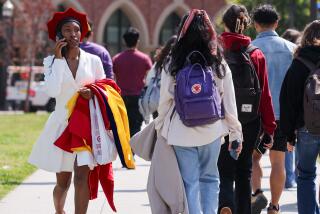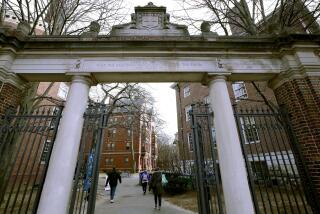Plea for Professor Tests Peking on Freedom, Political Openness
- Share via
PEKING — In 1982, Guo Luoji, a professor of philosophy at Peking University, was forced out of his post and banished from the city for advocating freedom of speech and criticizing the Communist Party’s policy toward intellectuals.
Guo was accused of making “serious political errors” and of having “bourgeois liberal tendencies” and was transferred to Nanjing University. He is still not permitted to publish articles in his own name.
Now, in an apparently concerted effort to test the government’s recent promise of greater academic freedom and a more open political climate, intellectuals are calling for Guo’s rehabilitation.
According to Chinese sources, intellectuals at Peking and Nanjing universities have written letters to the party Central Committee asking the authorities to admit that exiling Guo was a mistake and that he be allowed to return to Peking.
Commended in Article
One public sign of this campaign is an article that appeared not long ago in the newspaper Cultural Digest. It said: “Guo Luoji’s ideas, which had so long been considered wrong, are in harmony with the present practice of . . . creating a relaxed atmosphere and the current reform of the political system.”
According to a source familiar with the matter, the Guo case “will be a test of the party’s attitude toward intellectuals.”
The effort on Guo’s behalf puts the party hierarchy in an awkward position, because Guo is described by Chinese sources as a longtime personal enemy of the Chinese leader, Deng Xiaoping. In the early 1960s, when Deng was the party’s general secretary, he and Guo reportedly argued bitterly over questions of intellectual freedom and over Guo’s complaints about corruption in the party.
After the death of Chairman Mao Tse-tung in 1976, Guo, who was a member of the party, challenged the view of Deng and his allies that it was during the 1966-76 Cultural Revolution that the party went astray. Guo argued that the party had also made mistakes by stifling dissent in the first years of its rule.
Caricatures of Leaders
In the last several months, Chinese leaders and the official press have been talking of the importance of the right to dissent and of the need to create a political system based on law rather than personal power. Recently the party has even signaled its willingness to allow a somewhat more irreverent attitude toward China’s leaders.
Over the weekend, for example, the official Shanghai newspaper Liberation Daily published caricatures of Deng and the party general secretary, Hu Yaobang. Deng, a bridge player, was shown holding playing cards. Hu was shown wearing a Western suit and apparently leading an orchestra, with China singing a Western tune.
But it is far from clear that the authorities are willing to tolerate such longstanding critics as Guo, who for years has refused to go along with the party leadership.
As a member of the Peking Municipal People’s Congress, Guo defied the Communist tradition that all public votes are unanimous. He dissented when the congress elected to the National People’s Congress the widow of Kang Sheng, Mao’s former security chief, who was found responsible for excesses in the Cultural Revolution.
Dissenting Vote Praised
The recent article in the Cultural Digest said this action by Guo “lifted the ban against dissenting votes in the National People’s Congress and paved the way for voting according to one’s conscience.”
According to an account of the criticism of Guo published in the Peking University newspaper on June 11, 1982, Guo “says that if you cannot discuss problems openly, then it is limiting freedom of speech and it is feudal.” The paper goes on to say: “This is an alarming statement for a party member to make. . . . The kinds of things that Guo Luoji writes can be used by Hong Kong magazines to attack the party.”
Guo, the account says, “has had some differences of opinion with comrades of our party branch,” and it adds that “to assist Guo Luoji in his mistaken political attitudes, a meeting was organized to criticize him and help him.”
It was after the criticism at Peking University that Guo and his family were sent to Nanjing.
Last June, after the government started promising a new commitment to intellectual freedom, the Communist Party committee of Nanjing University’s philosophy department, in secret ballot, elected Guo to a leading party post.
More to Read
Sign up for Essential California
The most important California stories and recommendations in your inbox every morning.
You may occasionally receive promotional content from the Los Angeles Times.













